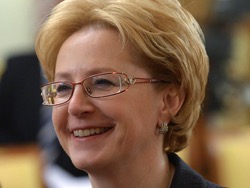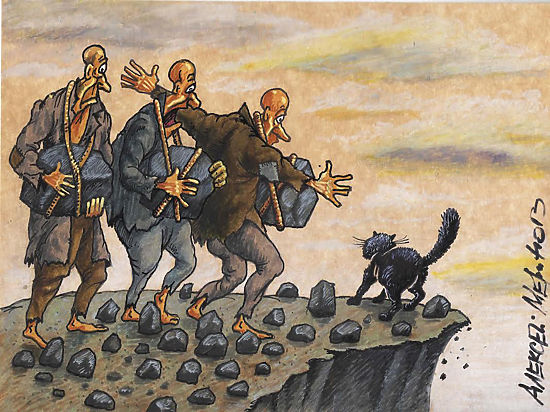As it became known “Kommersant”, the Ministry of Finance of the Russian Federation formulated, how exactly he intends to do the job of Vladimir Putin on the transfer of insurance contributions from off-budget funds to tax service. In directed to the White house “the Concept of changing legislation” proposes to introduce in the Tax code Chapter on the unified insurance Deposit, all equating it to taxes, to abolish the reduced rate of payment for high wages, and to avoid increased fiscal burden is to reduce the overall contribution rate from the current 30% to 28-29%. This concept is opposed to the approach of the Ministry of labor, which proposes to gradually increase the load on large salaries, not compensating for this decrease in total rates.
The letter of the Deputy Minister of Finance Ilia Trunina in the office of government dated 20 February, States “the Concept of amending legislation on insurance contributions to state extra-budgetary funds”, prepared by the Department for the execution of the January presidential decree on transferring the administration of these payments to the IRS. In many ways, the concept is based on earlier working papers supervised by the Finance departments, which offered a tougher version of the reform — the actual return of the single social tax (SST; see “Kommersant” on 21 January).
To the unified social tax the Ministry of Finance proposes not to return, but brings a theoretical framework of migration the rules of payment of insurance premiums in the Tax code. The Agency argues that, like taxes, “contributions on the stages of their calculation and payment are signs of gratuitousness and irreversible”. Amounts paid during the payment is not individualized — it happens later, after they arrive in the budget on the basis of data provided by the payers. “This allows us to conclude that the tax nature of premiums as payments,” writes the Agency.
In confirmation of this statement refers to adopted on 19 February in the first reading the bill introducing the fees for the same, as in the case of taxes, criminal liability for such nonpayment.
Contained in the letter of the Ministry of Finance and a long-standing argument of the lawyers, pointing to legal conflicts that arose after the previous reform of siperia 2010. According to the Constitution of the Pension Fund of Russia is not included into system of public authorities, so technically, he is not entitled to apply to the contributors coercive measures (fines, recovery of arrears). The Ministry of Finance indicates that the “application of measures of state coercion” in this area “is not a state body, but in fact a public institution”, which are the FIU and the FSS. In addition, the Ministry of Finance indicates that the insurance legislation lags behind the tax is among other things the Agency would like to distribute the contributions proven in the pre-judicial order of settlement of tax disputes. I would like the Ministry also combine forms of payment documents and statements.
Proceeding from all this, the Finance Ministry proposes to divide the administration income and expenditure of insurance premiums. Regulations the revenue side, the Agency intends to reserve, expense for labor. Have until March 1, 2016, the Department is ready to submit to the government a draft law, supplementing the list of Russian taxes and fees from the first part of the NC new insurance premium. In the second part of the code should appear in a separate Chapter 23.1 “Insurance premium”. It is proposed to establish a common base for calculation of insurance premiums all payments and benefits accrued “in favour of natural persons in employment relationships and civil-law contracts”. Now the basis for contributions to Fund three different.
Significant innovation — the Ministry of Finance in the new Chapter of the tax code proposes to abandon the current threshold wage used to calculate contributions. This is the so-called “tails”: when the total rate of contribution to the pension Fund at 22%, with salaries in excess of 796 thousand rubles a year, is paid another 10%. Contributions to the Fund of social insurance paid at the rate of 2.9 per cent — but only up to the amount of 718 thousand rubles a year. Finally, for the Foundation of medstrakh the salary of no — contribution rate is 5.1%. The Finance Ministry proposes that the inconsistency be eliminated by setting a new flat rate fee. However, in order to avoid a sudden increase of load, the new total bet prompted to install “below the current by 1-2 percentage points”, i.e. at the level of 28-29% vs. current 30%. Differentiation in the tariffs, including reduced, it is proposed to retain.
In addition to the NC rule will have Fiscal, Civil and criminal codes, the administrative code and another 17 laws on social insurance. These changes, says the Ministry of Finance, will be of a technical nature and do not affect the rules of calculation of social obligations to the population. Also promised “the possibility of development of insurance principles in the pension, social and medical support”. Amendments to plan of the Ministry of Finance should be submitted to the state Duma before may 1 of this year and come into effect from 1 January 2017.
Minfinovskih concept is opposed to the approach presented by the Ministry of labor. The Agency recommends gradually increase the rate for the “tail” contribution to the pension Fund from 10% to 20%, reduce the total bet in this case is not offered. “Social unit supported the idea to abolish the reduced rate of insurance contributions for high salaries, but the nature of the contributions should remain exactly insurance”,— said “Kommersant” a source in the government. The idea of the Ministry of Finance on the simultaneous reduction of the total rate of 1-2 points, according to him, you have to carefully calculate: perhaps the extension vsesouznogo base will not be able to compensate for the revenue decrease.








